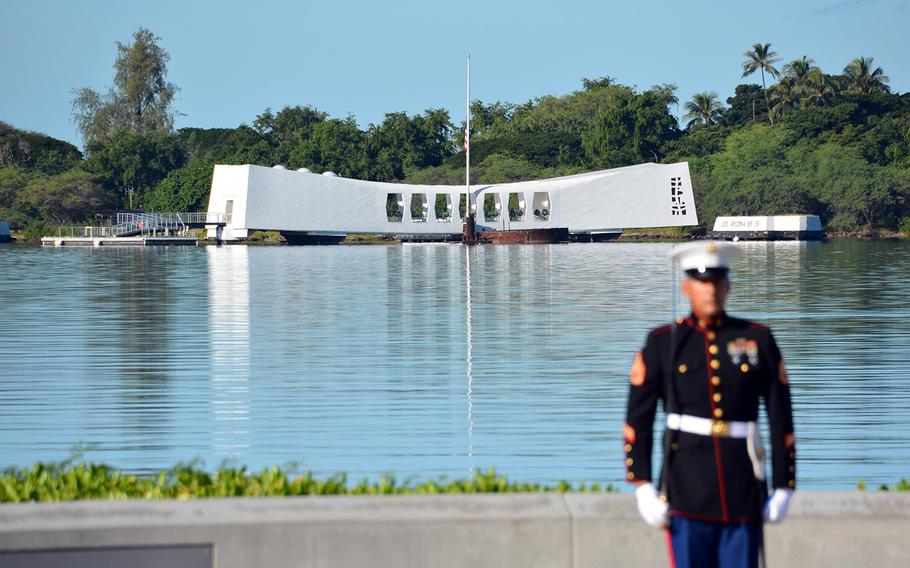Lou Conter during the Walk of Honor after a Dec. 7, 2019, ceremony at the Pearl Harbor National Memorial marking the surprise attack. Conter, the last living survivor of the USS Arizona, which sank during the attack on Pearl Harbor in 1941, died Monday, April 1, 2024. He was 102. (Wyatt Olson/Stars and Stripes)
Lou Conter, the last living survivor of the USS Arizona, which sank during the Dec. 7, 1941, attack on Pearl Harbor and has become the site of a memorial visited by millions each year, died Monday morning at his home in Grass Valley, Calif. He was 102.
His death was announced in a news release by Historic Pacific Parks, a not-for-profit organization that supports preservation of and education about significant sites in the region.
Conter was the last of 335 sailors and Marines who survived the destruction of the Arizona, which claimed the lives of 1,177 crew members after Japanese planes dropped armor-piercing bombs on the battleship.
The remains of more than 900 sailors and Marines remain entombed in the ship. The sunken hulk is now part of the USS Arizona Memorial.
Conter’s death leaves fewer than two dozen veterans of the Pearl Harbor attack known to be living.
For years, Conter, donned in Navy whites, had been a fixture at the annual Dec. 7 commemorations held at the Pearl Harbor National Memorial in Hawaii. He remained vigorous until recent years and often served as a spokesman for the dwindling coterie of survivors.
He did not attend the ceremony the past three years due to health issues, but he was present via recorded messages played for the audience.
“For those of us who survived that terrible day, we all shared something in common,” Conter said in the 2021 recording. “Dec. 7, 1941, changed our lives — not just for those of us who were on the USS Arizona or at Pearl Harbor but throughout the United States. It affected those of us who served as well as our families, our friends and our neighbors.”
The second-to-last living Arizona survivor, Howard “Ken” Potts, died about a year ago at age 102.

A Marine stands with his back to the USS Arizona Memorial during a rifle salute Dec. 7, 2019, at the Pearl Harbor National Memorial that was part of a ceremony marking the 78th anniversary of the Japanese surprise attack on Oahu. (Wyatt Olson/Stars and Stripes)
Conter epitomized what it meant to be a member of the Greatest Generation, which fared the Great Depression and spent nearly four years at war against Imperial Japan and Nazi Germany, said Aileen Utterdyke, president and CEO of Pacific Historic Parks.
“He had an exemplary career in the Navy and was steadfast in imploring the schools, parents and everyday Americans to always remember Pearl Harbor,” she said.
Lou Conter was born Sept. 13, 1921, in Ojibwa, Wis.
He enlisted in the Navy in 1939 and reported to the USS Arizona in Hawaii in 1940 with the rank of quartermaster third class.
On the Sunday morning of the surprise Japanese attack, Conter was on watch on the quarterdeck station between the ship’s third turret and main deck when sirens began wailing to announce the first wave, he said in an audio interview in 2015 for the National World War II Museum.
When the first bomb hit the Arizona, Conter was knocked forward onto the deck, while many of his fellow crew members were blown entirely off the ship.
“Within a few minutes, an armor-piercing bomb hit on the starboard side forward by number two turret, went through six decks into the lower handling room and blew up a million pounds of powder in the forward magazine,” he said. “That’s what blew up.”
Conter said an officer who witnessed the explosion from afar later told him that he saw the front of the Arizona rise out of the water about 30 feet before plunging back down.
Within 15 minutes, the ship rested at the bottom of Pearl Harbor.
Conter escaped on a lifeboat. In the following days, he worked at the grim task of recovering bodies from the harbor and containing fires, he said.
Later in the war, Conter piloted amphibious bomber planes and survived being shot down twice, once in shark-infested waters near New Guinea.
After the war, he became an intelligence officer and flew combat missions during the Korean War while he was assigned to the USS Bon Homme Richard.
He is credited with creating the Navy’s first survival, evasion, resistance and escape program, or SERE, according to the Historic Pacific Parks.
During the commemoration at Pearl Harbor in December, Marine Corps Capt. Ray Daniel Hower, Conter’s nephew, talked of the legacy left by the last Arizona survivor and others like him.
“Whenever my uncle Lou or any other veteran of World War II is recognized or thanked for their service, they humbly answer: ‘We just did what we had to do,’ ” Hower said. “Fair enough. But the fact that you did it, the sacrifices you made, the courage and heroism you showed, the determination to succeed that you demonstrated, the live sacrifice by the fallen, the legacy that you all built, remains unmatched and a lesson that keeps on teaching.”
Smoke rises from the battleship USS Arizona as it sinks during the Japanese attack on Pearl Harbor, Hawaii, Dec. 7, 1941. (U.S. Navy)